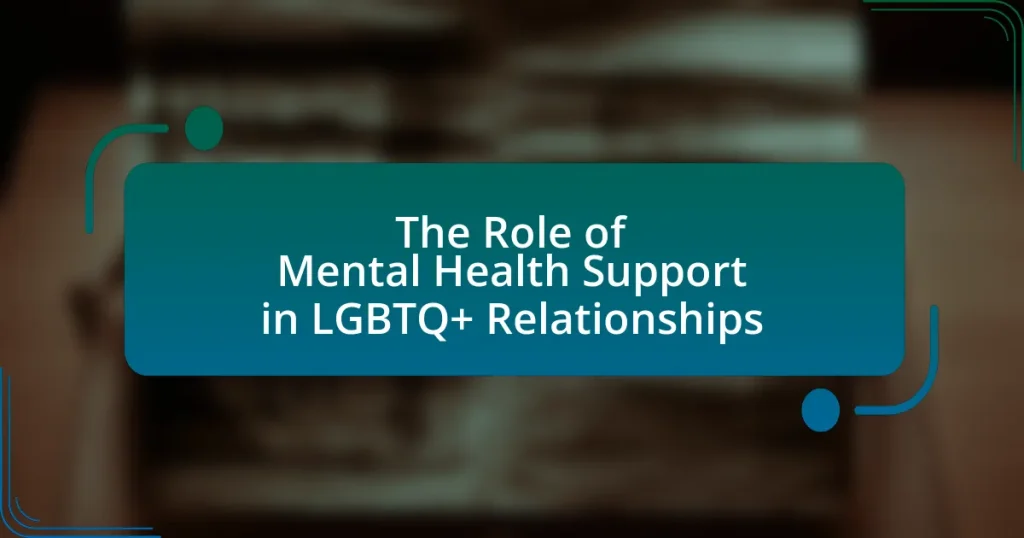The article examines the critical role of mental health support in LGBTQ+ relationships, highlighting how it addresses unique challenges such as discrimination, stigma, and identity issues that can lead to increased mental health concerns. It discusses the positive impact of mental health resources on relationship dynamics, including improved communication, emotional resilience, and conflict resolution. The article also outlines the specific mental health challenges faced by LGBTQ+ individuals, the benefits of therapy and support groups, and the importance of open communication in enhancing relationship satisfaction. Additionally, it provides information on accessing LGBTQ+-friendly mental health professionals and online support platforms, emphasizing best practices for fostering mental well-being within these relationships.

What is the Role of Mental Health Support in LGBTQ+ Relationships?
Mental health support plays a crucial role in LGBTQ+ relationships by providing individuals with the tools to navigate unique challenges such as discrimination, stigma, and identity issues. These challenges can lead to increased stress, anxiety, and depression, which can negatively impact relationship dynamics. Research indicates that LGBTQ+ individuals often experience higher rates of mental health issues compared to their heterosexual counterparts, highlighting the need for tailored mental health resources. For instance, a study published in the Journal of Homosexuality found that supportive mental health interventions can significantly improve relationship satisfaction and individual well-being among LGBTQ+ couples. Thus, mental health support not only fosters healthier relationships but also enhances overall mental health within the LGBTQ+ community.
How does mental health support impact LGBTQ+ relationships?
Mental health support significantly enhances LGBTQ+ relationships by fostering emotional resilience and improving communication. Access to mental health resources allows individuals within these relationships to address unique stressors, such as societal stigma and discrimination, which can otherwise lead to conflict and emotional distress. Research indicates that couples who engage in therapy or counseling report higher relationship satisfaction and better conflict resolution skills. For instance, a study published in the Journal of Marriage and Family found that LGBTQ+ couples who participated in mental health support showed improved relationship quality and reduced levels of anxiety and depression. This evidence underscores the critical role mental health support plays in strengthening the bonds and overall well-being of LGBTQ+ relationships.
What are the unique mental health challenges faced by LGBTQ+ individuals?
LGBTQ+ individuals face unique mental health challenges primarily due to societal stigma, discrimination, and lack of acceptance. These challenges manifest as higher rates of anxiety, depression, and suicidal ideation compared to their heterosexual counterparts. For instance, a study published in the American Journal of Public Health found that LGBTQ+ youth are more than twice as likely to experience mental health issues than non-LGBTQ+ youth, largely due to experiences of bullying and social rejection. Additionally, the minority stress theory posits that the chronic stress faced by LGBTQ+ individuals from societal prejudice contributes significantly to their mental health struggles.
How does mental health support enhance relationship dynamics in LGBTQ+ couples?
Mental health support enhances relationship dynamics in LGBTQ+ couples by providing tools for effective communication, emotional regulation, and conflict resolution. This support helps couples navigate unique stressors such as societal stigma and discrimination, which can strain relationships. Research indicates that couples who engage in mental health support report higher relationship satisfaction and lower levels of conflict. For instance, a study published in the Journal of Marriage and Family found that LGBTQ+ couples who participated in therapy experienced improved relationship quality and intimacy, demonstrating the positive impact of mental health resources on their dynamics.
Why is mental health support crucial for LGBTQ+ relationships?
Mental health support is crucial for LGBTQ+ relationships because it addresses the unique stressors and challenges faced by individuals within this community. LGBTQ+ individuals often experience higher rates of mental health issues, such as anxiety and depression, due to societal stigma, discrimination, and isolation. Research indicates that 39% of LGBTQ+ individuals report experiencing mental health issues compared to 18% of heterosexual individuals, highlighting the need for targeted support. Effective mental health support fosters resilience, improves communication, and enhances emotional intimacy in relationships, ultimately leading to healthier partnerships.
What role does mental health play in relationship satisfaction among LGBTQ+ partners?
Mental health significantly influences relationship satisfaction among LGBTQ+ partners. Research indicates that individuals with better mental health tend to experience higher levels of relationship satisfaction, as they are more capable of effective communication, emotional regulation, and conflict resolution. A study published in the Journal of Homosexuality found that LGBTQ+ individuals who reported higher levels of mental well-being also reported greater relationship satisfaction, highlighting the importance of mental health support in fostering healthy partnerships. Furthermore, mental health challenges, such as anxiety and depression, can negatively impact relationship dynamics, leading to increased conflict and dissatisfaction. Thus, prioritizing mental health is essential for enhancing relationship quality among LGBTQ+ partners.
How can mental health support mitigate the effects of discrimination on relationships?
Mental health support can mitigate the effects of discrimination on relationships by providing individuals with coping strategies and emotional resilience. Access to therapy and counseling helps individuals process experiences of discrimination, reducing feelings of isolation and promoting healthier communication within relationships. Research indicates that individuals who receive mental health support report improved relationship satisfaction and decreased conflict, as they learn to navigate the emotional turmoil caused by discrimination. For instance, a study published in the Journal of Counseling Psychology found that LGBTQ+ individuals who engaged in supportive therapy experienced enhanced relationship quality and reduced internalized stigma, demonstrating the positive impact of mental health support on relational dynamics.
What types of mental health support are available for LGBTQ+ couples?
LGBTQ+ couples have access to various types of mental health support, including couples therapy, individual counseling, support groups, and online resources. Couples therapy specifically addresses relationship dynamics and communication issues, often facilitated by therapists trained in LGBTQ+ issues. Individual counseling provides a space for partners to explore personal challenges related to their identity or relationship. Support groups offer community and shared experiences, fostering connection and understanding among LGBTQ+ individuals. Online resources, such as mental health apps and websites, provide accessible information and support tailored to LGBTQ+ needs. These forms of support are essential for addressing unique stressors faced by LGBTQ+ couples, such as discrimination and societal stigma, which can impact mental health and relationship satisfaction.
What are the benefits of therapy for LGBTQ+ relationships?
Therapy provides numerous benefits for LGBTQ+ relationships, including improved communication, enhanced emotional support, and a safe space to address unique challenges. Improved communication helps partners express their feelings and needs more effectively, reducing misunderstandings and conflicts. Enhanced emotional support fosters a deeper connection, allowing partners to navigate societal pressures and discrimination together. A safe space in therapy enables couples to explore issues such as identity, acceptance, and family dynamics without judgment. Research indicates that couples therapy can lead to increased relationship satisfaction and stability, particularly in marginalized communities, highlighting the importance of mental health support in fostering healthy LGBTQ+ relationships.
How do support groups contribute to mental health in LGBTQ+ relationships?
Support groups significantly enhance mental health in LGBTQ+ relationships by providing a safe space for individuals to share experiences and receive validation. These groups foster a sense of community, reducing feelings of isolation that LGBTQ+ individuals often face due to societal stigma. Research indicates that participation in support groups can lead to improved emotional well-being, as members report increased self-acceptance and decreased anxiety levels. For instance, a study published in the Journal of Homosexuality found that LGBTQ+ individuals involved in support groups experienced a 30% reduction in depressive symptoms compared to those who did not participate. This evidence underscores the critical role support groups play in promoting mental health within LGBTQ+ relationships.
How can LGBTQ+ couples access mental health support?
LGBTQ+ couples can access mental health support through various avenues, including specialized therapy services, community organizations, and online resources. Many therapists are trained in LGBTQ+ issues, and organizations like the LGBTQ+ National Help Center provide directories of affirming mental health professionals. Additionally, online platforms such as BetterHelp and Talkspace offer virtual therapy options tailored to LGBTQ+ individuals and couples, ensuring accessibility and confidentiality. Research indicates that LGBTQ+ individuals often face unique stressors, making targeted mental health support crucial for relationship well-being.
What resources are available for finding LGBTQ+-friendly mental health professionals?
LGBTQ+-friendly mental health professionals can be found through several key resources. The Psychology Today directory allows users to filter therapists by sexual orientation and gender identity, ensuring a supportive environment. The Gay and Lesbian Medical Association provides a searchable database of LGBTQ+-friendly healthcare providers, including mental health professionals. Additionally, the Trevor Project offers crisis intervention and mental health resources specifically for LGBTQ+ youth, connecting them with trained counselors. These resources are validated by their widespread use and recognition within the LGBTQ+ community, ensuring individuals can access affirming mental health support.
How can online platforms facilitate mental health support for LGBTQ+ individuals?
Online platforms can facilitate mental health support for LGBTQ+ individuals by providing accessible resources, community connections, and professional guidance tailored to their unique experiences. These platforms often host forums, chat rooms, and social media groups where LGBTQ+ individuals can share their experiences and seek advice in a safe environment, reducing feelings of isolation. Research indicates that online support can significantly improve mental health outcomes; for instance, a study published in the Journal of Medical Internet Research found that online interventions led to reduced symptoms of depression and anxiety among LGBTQ+ youth. Additionally, many platforms offer access to licensed therapists who specialize in LGBTQ+ issues, ensuring that individuals receive informed and empathetic care.
What best practices can enhance mental health support in LGBTQ+ relationships?
Best practices that can enhance mental health support in LGBTQ+ relationships include fostering open communication, promoting inclusivity, and providing access to specialized mental health resources. Open communication allows partners to express their feelings and concerns, which is crucial for emotional well-being. Research indicates that couples who engage in honest dialogue report higher relationship satisfaction and lower levels of anxiety. Promoting inclusivity involves creating a safe environment where both partners feel accepted and valued, which can significantly reduce stress and improve mental health outcomes. Additionally, access to specialized mental health resources, such as LGBTQ+-affirmative therapy, has been shown to effectively address unique challenges faced by LGBTQ+ individuals, leading to improved mental health and relationship stability.
How can open communication improve mental health support in relationships?
Open communication significantly enhances mental health support in relationships by fostering trust and understanding between partners. When individuals express their feelings, concerns, and needs openly, it creates a safe environment where both partners feel valued and heard. This is particularly crucial in LGBTQ+ relationships, where external societal pressures can exacerbate mental health challenges. Research indicates that couples who engage in open dialogue about mental health issues report higher relationship satisfaction and lower levels of anxiety and depression (Gottman, J. M., & Silver, N. 2015, “The Seven Principles for Making Marriage Work”). By discussing mental health openly, partners can collaboratively identify coping strategies and provide emotional support, ultimately leading to improved mental well-being for both individuals.
What strategies can couples use to support each other’s mental health effectively?
Couples can support each other’s mental health effectively by practicing open communication, establishing trust, and engaging in shared activities. Open communication allows partners to express feelings and concerns, which fosters understanding and reduces feelings of isolation. Establishing trust creates a safe environment where both individuals feel comfortable sharing vulnerabilities. Engaging in shared activities, such as exercise or hobbies, promotes bonding and can alleviate stress. Research indicates that couples who communicate openly and engage in mutual support report higher relationship satisfaction and better mental health outcomes.


